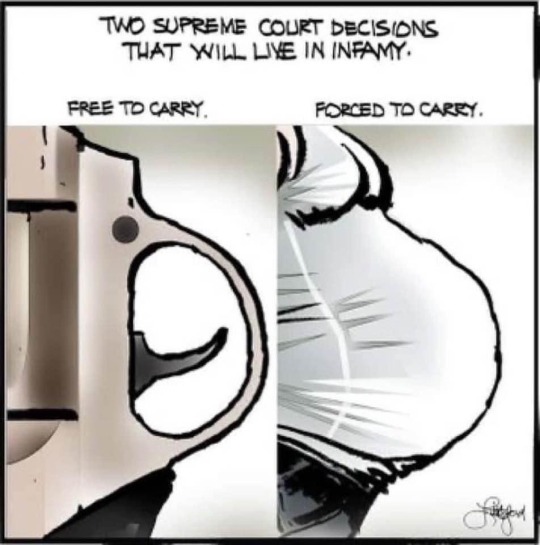#bruen
Text

There've been about ten GryphIns fanfics out there now, but to help encourage fans to share their fics for other fans to read, I promised to write my own non-canonical GryphIns fic if 10 get posted to AO3.
Looks like a new one was added today by CockatielForger!
https://archiveofourown.org/works/55411228/chapters/140593198
#gryphins#gryphon insurrection#gryphon#creature fantasy#fantasy#griffin#griffon#gryfon#Ferrick#Bruen#CockatielForger#ao3 fanfic#fanfiction#fanfic
2 notes
·
View notes
Text
The Circuit Barrage: The Justices' Divergent Votes Based on Lower Courts
Introduction
While few people would argue against the proposition that the Supreme Court Justices are some of the most intelligent legal luminaries in the United States, these luminaries often rule in opposing directions. The number of the Court’s split decisions often outnumber the number of unanimous decisions. During the 2021 Term, the number of 6-3 splits alone outnumbered the number of…

View On WordPress
#Behavior of Federal Judges#Bonica and Sen#Bruen#Epstein#JCS#judicial common space#justices#Landes#Legal Analytics#Loper Bright v. Raimondo#Lopez v. Smith#Paul Clement#Posner#Supreme Court#Supreme Court Database
0 notes
Text
It looks like Illinois will have to start respecting #Bruen.
https://www.foxnews.com/media/illinois-sheriffs-brace-fallout-americas-dangerous-law-supreme-court-ends-cash-bail
0 notes
Text

On June 23, 2022, the Supreme Court ruled in a 6-3 decision in the New York State Rifle & Pistol Association Inc. v. Bruen case to rule a New York state law that required persons provide “proper cause” before carrying a gun as unconstitutional.
What do you think of the decision? Read & discuss at @4bnewsworld. Link to vote!
#guns #gun #newyork #concealcarry #pistol #bruen #glock #pewpew #gunsdaily #tactical #ar #firearms #shooting #pistol #military #ndamendment #rifle #airsoft #pewpewlife #weapons #hunting #edc #freedom #america #gunporn #usa #army #weaponsdaily #merica
#guns#gun#New York#conceal carry#pistol#bruen#glock#pew pew#guns daily#tactical#ar#firearms#shooting#pistols#military#rifle#ndamendment#weapons#hunting#edc#freedom#constitution#america#weapons daily#airsoft
0 notes
Text
The idea that brunhilde is represented by winter, this cold yet beautiful and lonely season, while calla is represented by the joy and warmth of summer gets me every time nd I made the damn characters
#smth smth the ice queen who's heart never froze over bc of the love nd warmth of her wife#the potato speaks#bruen#calla
0 notes
Text
"Far from being exceptional in American history, gun-control regulations are the default. If 'Bruen' was designed to nullify the constitutional basis for many gun laws, it ought to fail."
--Robert J. Spitzer, political science professor emeritus at SUNY Cortland

Robert J. Spitzer, professor emeritus at SUNY Cortland outlines the early--and plentiful--history of gun regulation laws in early American history. Consequently, Clarence Thomas's 2022 Bruen decision might not be the disaster for gun control that some people have thought. Below are some excerpts from the article.

In the summer of 1619, the leaders of the fledgling Jamestown colony came together as the first general assembly to enact “just Laws for the happy guiding and governing of the people there inhabiting.” Consisting of the governor, Sir George Yeardley; his four councillors; and 22 elected “burgesses,” or representatives, the group approved more than 30 measures. Among them was the nation’s first gun law:
"That no man do sell or give any Indians any piece, shot, or
powder, or any other arms offensive or defensive, upon
pain of being held a traitor to the colony and of being
hanged as soon as the fact is proved, without all redemption."
After that early example of gun control came many more laws placing restrictions on the ownership and use of firearms. If guns have always been part of American society, so have gun laws.
This fact might come as a surprise to some gun-rights advocates, who seem to believe that America’s past was one of unregulated gun ownership. That view received a big assist in 2022, when the Supreme Court declared in "New York State Rifle & Pistol Association Inc. v. Bruen" that the constitutionality of modern gun laws depends on whether they are “consistent with this Nation’s historical tradition of firearm regulation.” In other words, the constitutional standard for any modern gun law boils down to whether you can find a good precedent for it back in the 1700s or 1800s.
The advocates’ assumption is that such precedents are few and far between, but thanks to the work of researchers and the digitization of archival material, thousands of old gun laws, of every imaginable variety, are now available for reference. Far from being exceptional in American history, gun-control regulations are the default. If "Bruen" was designed to nullify the constitutional basis for many gun laws, it ought to fail.
[...]
Throughout this long period in the history of the republic, up until the beginning of the 20th century, gun laws placed conditions or restrictions on weapons access for a wide variety of citizens—in particular, indentured servants, vagrants, non-Protestants, those who refused to swear an oath of loyalty to the government, felons, foreigners, minors, and those under the influence of alcohol. Numerous laws regulated hunting practices, as well as firearms’ carry, use, storage, and transportation; regulated the manufacture, inspection, storage, and sale of firearms; imposed gun licensing; and restricted dangerous or unusual weapons.
Despite the Thomas opinion’s claim that “the historical record yields relatively few 18th- and 19th-century ‘sensitive places’ where weapons were altogether prohibited,” some local authorities outlawed the discharge of firearms in or near towns, buildings, or roads, as well as after dark, on Sundays, at public gatherings, and in cemeteries. In some jurisdictions, any use of a firearm that wasted gunpowder was also an offense.
[...]
In the post-revolutionary 1800s, as rising violent crime led more people to arm themselves, a total of 42 states (plus the District of Columbia) enacted laws against concealed carry. Three more did so in the early 1900s, so that the total included almost every state in the Union. As many states from the 1700s to 1900s also enacted some form of weapons-licensing law.
That’s not all. Over that same period, at least 22 states restricted any gun carrying, including of long guns. Moreover, across the entire period, three-quarters of the states had laws either against “brandishing”—waving a gun around in a menacing or threatening manner—or merely having a weapon on display in public.
[...]
In addition, even though for much of its history America was an agrarian country...its lawmakers and enforcers were inventive and determined about ensuring public safety. When they perceived a threat to that order from firearms, they passed laws to restrict or prevent them. And back then, by and large, no court struck those laws down.
That is what is truly consistent with this nation’s historical tradition of firearm regulation. So if we accept the originalist premise of "Bruen," the actual result should be to render a broad array of gun regulations constitutional.
[color emphasis added]
#american history#gun control#america's original gun control#robert j. spitzer#bruen decision#the atlantic
91 notes
·
View notes
Text

#us politics#political cartoons#Edward Littleford#drawings#art#gun rights#gun control#gun violence#permitless carry#abortion bans#abortions#abortion is a human right#abortion is better than negligence#us supreme court#scotus#dobbs v. jackson women’s health organization#roe v. wade#new york state rifle & pistol association v. bruen#nysrpa v. bruen#2022
356 notes
·
View notes
Text
The U.S. Supreme Court on Tuesday seemed likely to uphold a federal law that bans gun possession for anyone subject to a domestic violence court order. If so, the decision would be a small retreat from the court's sweeping decision on gun rights last year.
From the outset Tuesday, the Justices wrestled with the consequences of their far-reaching 2022 decision, declaring that in order for a gun law to be constitutional, it has to be analogous to a law that existed at the nation's founding in the late 1700s. The question Tuesday was how precise that analog has to be.
DANGEROUS VS. RESPONSIBLE
Solicitor General Elizabeth Prelogar, representing the government, told the Justices that under the court's most recent decisions, including last year's, Congress may disarm those who are not law-abiding, responsible citizens.
"There is no historical evidence" that the Second Amendment "was originally understood to prevent legislatures from disarming dangerous individuals," she said.
But, as several Justices noted, people do all kinds of irresponsible things — driving over the speed limit, putting the trash out on the wrong day — but nobody would suggest they lose their constitutional rights for that. Pressed by Chief Justice John Roberts, Prelogar agreed that the word responsible is "something of a placeholder for dangerousness."
"There's no daylight at all then between not responsible and dangerous?" Justice Brett Kavanaugh asked. No daylight, Prelogar agreed, adding that "our understanding of what history and tradition reflect ... is those whose possession of firearms presents an unusual danger beyond the ordinary citizen."
"Why did you use the term 'responsible' if what you meant was dangerous?" Roberts asked.
"Well, we relied on the same phrasing the Court itself used when it first articulated" the right to bear arms principle in 2008, she replied.
Most of the Court's conservatives seemed to accept that proposition, with only Justices Samuel Alito and Clarence Thomas remaining skeptical. Thomas was the author of last year's broad decision — a decision so expansive and unspecific that the lower courts have interpreted it in dramatically different ways. As Justice Elena Kagan observed, "There seems to be a fair bit of division, and a fair bit of confusion about what Bruen [last year's case] means and what Bruen requires of the lower courts."
BACKGROUND TO THE CASE
Challenging the federal law in Tuesday's case was Zackey Rahimi. A Texas judge stripped him of his license to have guns when it granted a domestic violence court order after Rahimi allegedly assaulted his girlfriend in a parking lot, and then fired a gun at a bystander who saw the assault. After he continued firing guns in public, even after the court order, police searched his residence and found guns, magazines and ammunition. He was sentenced to six years in prison for violating the federal law that bans domestic abusers under court order from possessing guns.
Rahimi, however, continued to press his challenge to the federal law, and the Fifth Circuit Court of Appeals, citing the Supreme Court's 2022 ruling, declared the law unconstitutional.
Rahimi's lawyer, federal public defender Matthew Wright, struggled to defend that decision Tuesday, telling the Justices there is no law from the founding era that is analogous to this one.
"There's no history of [gun] bans. They don't exist," Wright told the court.
Justice Kagan asked if the presence of a similar ban at the time of the founding is essential after the court's decision last year in the Bruen case. If there isn't a similar ban from the founding era, "we say that the government has no right to do anything?" she asked incredulously.
"That's largely what Bruen says," Wright replied.
Wright also maintained that those accused of domestic violence have few protections in court prior to being slapped with a ban on guns.
Justice Amy Coney Barrett wasn't buying that, noting that Rahimi's ex-girlfriend "did submit a sworn affidavit giving quite a lot of detail about the various threats. It's not like he just showed up and the judge said 'credible finding of violence.'"
Roberts was even more direct, asking, "You don't have any doubt that your client is a dangerous person, do you?"
Wright replied, "I would want to know what dangerous person means."
"Someone who is shooting at people," Roberts shot back.
"That's fair," a sheepish Wright conceded.
Kagan followed up: "Do you think the Congress could disarm people who are mentally ill, who've been committed to mental institutions?"
"I think maybe," Wright answered, prompting this from Kagan: "I will tell you the honest truth, Mr. Wright. I feel like you are running away from your argument because the implications of your argument are just so untenable that you have to say 'no, that is not really my argument.'"
Indeed, the Court's decision in the Rahimi case will have ripple effects. It may make lower courts more hesitant to strike down laws aimed at preventing dangerous people from having guns.
But as several Justices said Tuesday, this is the easy case. The harder ones lie ahead, among them: federal and state laws that bar convicted felons — even those convicted of non-violent crimes — from having guns.
#us politics#news#npr#us supreme court#second amendment#2nd amendment#gun rights#gun reform#gun regulation#domestic violence#domestic abusers#Elizabeth Prelogar#Justice John Roberts#Justice Brett Kavanaugh#Justice Samuel Alito#justice clarence thomas#Justice Elena Kagan#New York State Rifle & Pistol Association Inc. v. Bruen#Zackey Rahimi#Texas#Fifth Circuit Court of Appeals#Justice Amy Coney Barrett#Matthew Wright#founding fathers#gun bans#2023
11 notes
·
View notes
Note
Enough with the easy ones! What nightmare child actor could perfectly capture the horrors of The Infamous Marsha Bruenig™?
LMAO alright, again very charitable interpretation of her considering how most townie faces look on kids

Molly Jane McCarthy!
11 notes
·
View notes
Text
It's Political
It’s Political
Welp, its been a hard week to be an American and a woman. I don’t usually use this platform to post political shit. I’ve heard it floated around author circles that doing so could alienate fans. I get it. However, sometimes something so egregious happens that speaking out is necessary. This is going to be a long post and its going to piss some of you off. To that, I say good. You should be pissed…

View On WordPress
#2381. Treason#2nd amendment#abortion#abortion rights#gun control#Martin Niemoller#Nancy McCall#New York Rifle and Pistol Association v. Bruen#roe v wade#SCOTUS
42 notes
·
View notes
Text
A federal judge just put a pause on Illinois' ban on "assault weapons" and "high capacity" magazines, soon after another federal court upheld a similar ban, and you know what that indicates it's about time for
#the bruen smackdown shall commence#and they also need to stop states from barring ownership of suppressors because i for one value my hearing
2 notes
·
View notes
Text
Sorry but sometimes hyper focus is really annoying. Would love to be normal about things
4 notes
·
View notes
Link
#texas#new york state rifle and pistol association v. bruen#texas attorney general ken paxton#second amendment
8 notes
·
View notes
Link
Paul Clement and Erin Murphy, the lawyers who successfully argued against New York’s law restricting conceal-carry gun permits, were told by Kirkland & Ellis they had to stop representing Second Amendment plaintiffs or find another firm.
#SCOTUS#Kirkland & Ellis#lawyers#attorneys#Greg Wilson#Daily Wire#Paul Clement#Erin Murphy#concealed carry#Second Amendment#New York State Rifle & Pistol Association v. Bruen#may issue#NY
10 notes
·
View notes


